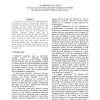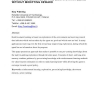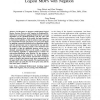458 search results - page 33 / 92 » Q-Decomposition for Reinforcement Learning Agents |
ATAL
2007
Springer
14 years 1 months ago
2007
Springer
This paper presents the dynamics of multiple reinforcement learning agents from an Evolutionary Game Theoretic (EGT) perspective. We provide a Replicator Dynamics model for tradit...
CIMCA
2006
IEEE
14 years 1 months ago
2006
IEEE
In this paper, a distributed and adaptive approach for resource discovery in peer-to-peer networks is presented. This approach is based on the mobile agent paradigm and the random...
NN
2007
Springer
13 years 7 months ago
2007
Springer
Reinforcement learning is based on exploration of the environment and receiving reward that indicates which actions taken by the agent are good and which ones are bad. In many app...
AAAI
1994
13 years 9 months ago
1994
Researchers in the eld of Distributed Arti cial Intelligence (DAI) have been developing e cient mechanisms to coordinate the activities of multiple autonomous agents. The need for...
JCP
2008
13 years 7 months ago
2008
In this paper, we propose a model named Logical Markov Decision Processes with Negation for Relational Reinforcement Learning for applying Reinforcement Learning algorithms on the ...



